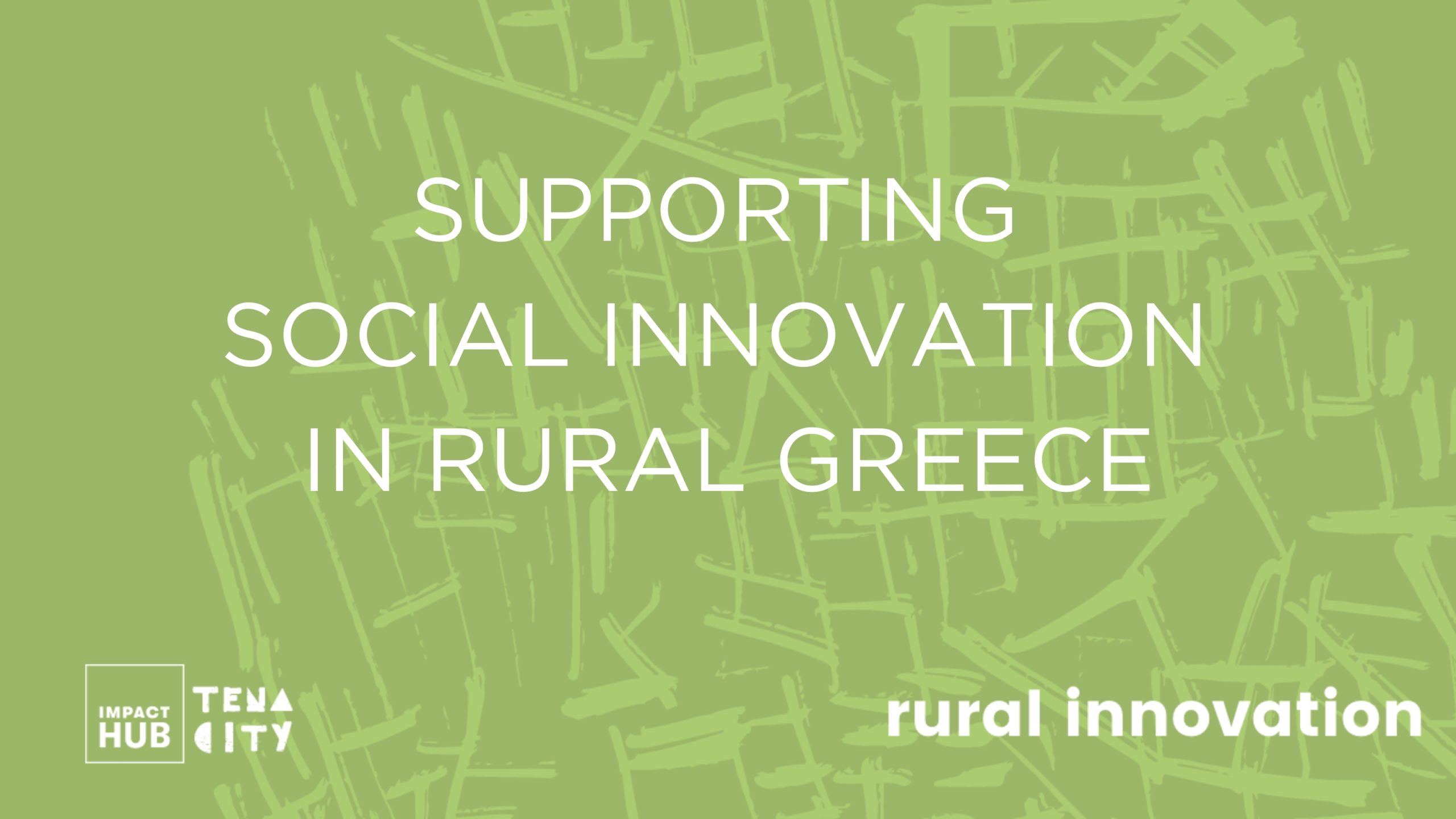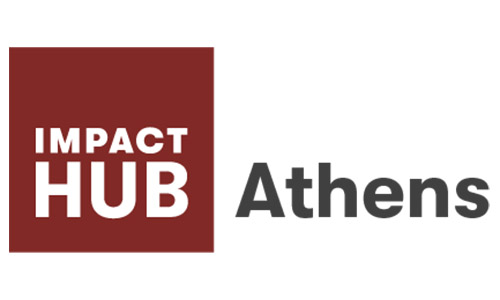
Impact Hub Athens and Google.org are collaborating to empower the entrepreneurial community in the Greek region.
They have launched a comprehensive economic support program, providing a funding of 150K for the following entrepreneurial entities, which will develop programs specifically targeting environmental sustainability:
- Rural Incubator: Northern/Southern Pindos, High Mountains
- Rural Incubator: Rethymno Prefecture, Bizrupt NGO
- Rural Incubator: Florina/Western Macedonia, Active Youth Group of Florina (O.E.N.E.F.)
- Rural Incubator: Development Agency of Karditsa, Development Corporation S.A.
- Rural Incubator: Messinia, ETAP, Development and Progress Corporation of Peloponnese and Ionian Islands
- Rural Incubator: Alexandroupolis, LightHub – Alexandroupolis Chamber of Commerce
- Rural Incubator: Cyclades, Impact Hub Athens
& the fellows:
- Southern Tzoumerka, Bouloki – Traveling Workshop for Traditional Building Techniques
- Kalamata, Phaos Cooperative Society
With a decade of experience in the field of social entrepreneurship, they are expanding the social economy ecosystem to the region. Their objective is to establish and sustain a network of entrepreneurial entities throughout Greece, which will continue to actively engage and collaborate with Impact Hub Athens even after the program’s completion. Together, they aim to generate and implement sustainable solutions for the environment.

Benefits
Financial Support of 20-50k for 3-5 Entrepreneurial Structures, Educational Tools, Mentoring, Empowerment, and Networking.
Read more
Here are the detailed benefits of the program:
- Funding: Providing financial support in the range of 20-50k.
- Educational Workshops: Conducting skill development workshops to enhance the capabilities of the entrepreneurial team. These workshops will focus on methodologies and tools relevant to social entrepreneurship.
- Implementation Guide: Offering a comprehensive guide for implementing a social entrepreneurship program. This guide includes ready-made educational materials.
- Strategy and Development Guidance: Providing guidance on strategic planning and the development of entrepreneurial centers.
- Individual Support and Coaching: Offering personalized support and coaching throughout the implementation of the social entrepreneurship program.
- Official Connection to Impact Hub: Establishing an official connection with the Impact Hub network and community.
Furthermore, the program aims to achieve the following specific objectives:
- Skills Development Pathway: Establishing a clear pathway for skill development through innovative approaches to entrepreneurial learning.
- Professional Training Approach: Designing a professional training program tailored to the specific needs of each region. This training will focus on addressing climate change and facilitating the green transition in small provincial areas.
To accomplish these objectives, the program will implement a series of activities that will lead to the following outcomes:
- Empowerment and Skill Enhancement: Empowering and equipping 30 individuals with new skills, tools, and connections to develop their entrepreneurial ideas.
- Innovative Methodology: Codifying a proven methodology for fostering innovation in the province. This methodology will be shared and adopted through learning workshops, guidance, and networking opportunities.
- Inclusive Educational Program: Creating an inclusive educational curriculum that takes a holistic approach to entrepreneurial empowerment. This program will strongly emphasize gender perspectives, with a target of 50% female participants and inclusion of other marginalized individuals.
- Publication of Best Practices: Compiling a publication featuring insights, conclusions, and case studies on the development of social and environmental entrepreneurship and innovation in the province. This publication will serve as a resource to engage local decision-makers and other important stakeholders.
- Network Expansion: Establishing a network of 5 strategic partners who are committed to advancing social and environmental entrepreneurship and innovation programs in the region. This network will also promote the adoption of best practices nationwide through communication and collaborative efforts.

Why
Innovation in rural, island, and mountainous areas is garnering significant attention from diverse stakeholders, including policymakers, researchers, and entrepreneurs. This growing trend holds increasing importance, particularly when viewed in the context of the climate crisis. It is crucial to promote the sharing of best practices and case studies, engage local partners, and empower communities through knowledge exchange and skill development. These efforts aim to foster the creation, operation, and growth of sustainable initiatives that prioritize the well-being of both the environment and the local population.
Read more
Smaller regions in the province show less engagement in the transition towards environmental sustainability compared to urban areas. Disadvantaged populations often do not prioritize environmental sustainability, highlighting the importance of empowering and mobilizing pioneering entrepreneurial initiatives in these regions.
Moreover, there is a pressing need for a comprehensive “ecosystemic” change to bring empowerment and support services closer to society as a whole. Promoting entrepreneurship and self-employment as effective means of job creation, skill development, and opportunities for the unemployed and vulnerable individuals creates new pathways for their full participation in society and the economy, with a strong emphasis on sustainability and resilience.
Interest in innovation within rural, island, and mountainous areas is growing among various stakeholders, particularly policymakers, researchers, and entrepreneurs. This trend will gain further strength and significance, especially when viewed through the lens of the climate crisis. It is essential to facilitate the sharing of best practices and case studies, involve local partners, and empower communities from within through knowledge exchange and skill development. This approach will contribute to the establishment, operation, and expansion of sustainable initiatives that consider the well-being of both nature and people.
Furthermore, promoting gender equality in these areas is of utmost importance. Rural areas are home to over 70% of the world’s poor, and the majority of rural women and men rely on agriculture for their livelihoods. These populations, particularly women, face limited access to financial resources, services, skill development organizations, productive infrastructure, and cutting-edge technology. Enhancing women’s training and facilitating their connections with entrepreneurs, peers, and partners across the country will strengthen local economies, foster employment opportunities, increase their representation in decision-making processes, and promote active participation. Ultimately, this approach will transform local communities by promoting values of equality and inclusion, leading to an improved quality of life for all individuals.
Approach
So, how does innovation happen in rural areas, and how can we boost it?
“Green innovation” can be achieved through the following steps:
- Mapping the local needs and challenges related to green transition and environmental sustainability.
- Promoting the concept of green and just transition and emphasizing its application for local development in social, environmental, and economic aspects.
- Developing the residents’ entrepreneurial skills, with a particular focus on social economy principles and innovation.
- Implementing pilot programs that provide entrepreneurial support to transform business ideas into viable ventures.
- Promoting the outcomes to mobilize stakeholders across the regions of Greece, fostering the development of the social entrepreneurship and innovation ecosystem.
- Utilizing the process to identify policy requirements for intervention and support at the local level.
- Organizing and participating in meetings, conferences, and events in collaboration with local decision-making bodies to establish direct connections between beneficiaries and local authorities. This involvement includes specific monitoring actions to provide support.
- By following these steps, we can nurture innovation in provincial areas and create a thriving environment for sustainable development.

Who is our target audience?
Our target audience consists of entrepreneurship support organizations (such as innovation hubs, incubators, etc.) and community-building organizations that operate in provincial areas with populations of less than 100,000. These organizations play an active role in managing and nurturing communities within these regions.
Read more
Compatibility Criteria
We are seeking entities and groups within the Greek territory that meet the following criteria:
- Operate in target areas with populations of less than 100,000.
- Demonstrate a track record of supporting entrepreneurship and innovation at both the organizational and implementation team levels.
- Align with and embrace the applicant’s long-term strategy for community development, fostering entrepreneurial skills, empowering underrepresented groups, and/or promoting environmental sustainability.
- Have the potential to sustain the proposed program beyond the period of financial support.
- Provide a comprehensive presentation outlining the anticipated impact of the program on the local community.
- Forge relationships with existing frameworks, financial opportunities, and a willingness to collaborate with local stakeholders such as government entities, existing entrepreneurs, academic institutions, etc. Moreover, exhibit a focus on development areas that align with environmental sustainability.
- Express a willingness to actively participate and draw inspiration from the broader vision of revitalizing rural areas, supporting small communities, and safeguarding the country’s environmental resources.
- Explore innovative and sustainable approaches to development with enthusiasm and energy.
- Demonstrate commitment, determination, perseverance, and a problem-solving orientation.
Selection Criteria
Our partners will be chosen based on the following criteria:
- Value proposition and alignment with the organization’s mission and values
The beneficiary organization has a well-defined goal of empowering local communities, promoting innovation, and undertaking environmental initiatives. The design and implementation of an entrepreneurship empowerment program are clearly identified as a solution to address social and environmental challenges specific to the target area. Moreover, the program is in line with the existing activities undertaken by the organization.
Sustainability
- The project has a clearly defined target market/beneficiaries, provided services, and projected revenue streams, ensuring its economic sustainability through operational efficiency and collaborations.
- The target market is substantiated by evidence or validated through the expertise of professionals and local stakeholders.
- The final service and value chain components exhibit strong differentiation from what is currently available in the same region.
- A well-defined financing plan and/or business activity plan is presented, enabling the program’s replication as designed in the future timeframe.
- Entrepreneurial Spirit & Abilities
- The team embarking on the entrepreneurship support program through the open call has a proven track record in empowering entrepreneurship and/or developing communities in the specific area. They also possess extensive knowledge and skills in the relevant field, coupled with a strong vision for implementing the project.
- They exhibit a willingness to embrace new endeavors with enthusiasm and energy, and they distinguish themselves through their entrepreneurial spirit. This spirit may stem from previous experience in entrepreneurial activities or roles that demand entrepreneurial traits, such as unwavering commitment, decisive determination, unwavering perseverance, and a solution-oriented approach.
Collaboration
- The entrepreneurship support program aims to establish collaborative and mutually beneficial relationships with existing local and regional structures.
- There is a willingness to actively participate, contribute, and draw inspiration from the broader vision of revitalizing the area, the specific location, or the region. Additionally, the project seeks to create favorable conditions for its successful implementation.
Impact
- The entrepreneurship support program aims to address the needs of the local population and respond to the challenges and opportunities in the region.
- There is a clear intention to generate job opportunities and promote fair employment relationships, including considerations for internal staff mobility. It is crucial to demonstrate a commitment to sustaining these job positions and ensuring the equitable distribution of related responsibilities beyond the period of financial support.
Connection to the Local Area
Applicants should have an active connection to the local community and engage with key stakeholders in the respective regions. This connection demonstrates an understanding of the local context and a commitment to collaborating with relevant actors for the program’s success.



